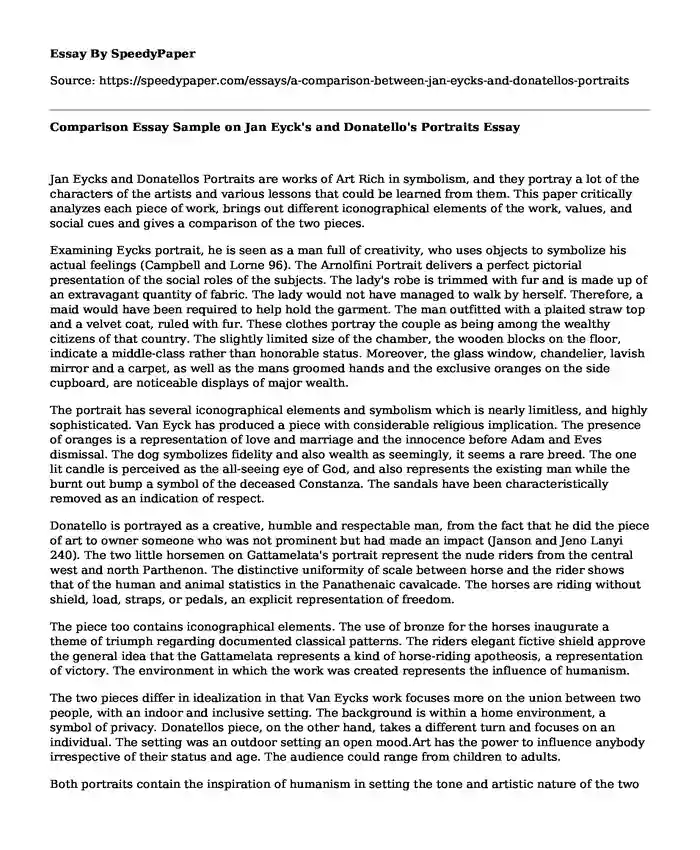Jan Eycks and Donatellos Portraits are works of Art Rich in symbolism, and they portray a lot of the characters of the artists and various lessons that could be learned from them. This paper critically analyzes each piece of work, brings out different iconographical elements of the work, values, and social cues and gives a comparison of the two pieces.
Examining Eycks portrait, he is seen as a man full of creativity, who uses objects to symbolize his actual feelings (Campbell and Lorne 96). The Arnolfini Portrait delivers a perfect pictorial presentation of the social roles of the subjects. The lady's robe is trimmed with fur and is made up of an extravagant quantity of fabric. The lady would not have managed to walk by herself. Therefore, a maid would have been required to help hold the garment. The man outfitted with a plaited straw top and a velvet coat, ruled with fur. These clothes portray the couple as being among the wealthy citizens of that country. The slightly limited size of the chamber, the wooden blocks on the floor, indicate a middle-class rather than honorable status. Moreover, the glass window, chandelier, lavish mirror and a carpet, as well as the mans groomed hands and the exclusive oranges on the side cupboard, are noticeable displays of major wealth.
The portrait has several iconographical elements and symbolism which is nearly limitless, and highly sophisticated. Van Eyck has produced a piece with considerable religious implication. The presence of oranges is a representation of love and marriage and the innocence before Adam and Eves dismissal. The dog symbolizes fidelity and also wealth as seemingly, it seems a rare breed. The one lit candle is perceived as the all-seeing eye of God, and also represents the existing man while the burnt out bump a symbol of the deceased Constanza. The sandals have been characteristically removed as an indication of respect.
Donatello is portrayed as a creative, humble and respectable man, from the fact that he did the piece of art to owner someone who was not prominent but had made an impact (Janson and Jeno Lanyi 240). The two little horsemen on Gattamelata's portrait represent the nude riders from the central west and north Parthenon. The distinctive uniformity of scale between horse and the rider shows that of the human and animal statistics in the Panathenaic cavalcade. The horses are riding without shield, load, straps, or pedals, an explicit representation of freedom.
The piece too contains iconographical elements. The use of bronze for the horses inaugurate a theme of triumph regarding documented classical patterns. The riders elegant fictive shield approve the general idea that the Gattamelata represents a kind of horse-riding apotheosis, a representation of victory. The environment in which the work was created represents the influence of humanism.
The two pieces differ in idealization in that Van Eycks work focuses more on the union between two people, with an indoor and inclusive setting. The background is within a home environment, a symbol of privacy. Donatellos piece, on the other hand, takes a different turn and focuses on an individual. The setting was an outdoor setting an open mood.Art has the power to influence anybody irrespective of their status and age. The audience could range from children to adults.
Both portraits contain the inspiration of humanism in setting the tone and artistic nature of the two artists. The humanist inspiration on both works is not only validated by documented connections they had with present philosophers but also by features of the works themselves.
Works Cited
Campbell and Lorne. The Fifteenth Century Netherlandish Paintings, London: National Gallery, 1998. Print.
Janson, H. W. and Jeno Lanyi. The Sculpture of Donatello. . NJ: Princeton UP, 1975. Print.
Cite this page
Comparison Essay Sample on Jan Eyck's and Donatello's Portraits. (2019, Aug 28). Retrieved from https://speedypaper.net/essays/a-comparison-between-jan-eycks-and-donatellos-portraits
Request Removal
If you are the original author of this essay and no longer wish to have it published on the SpeedyPaper website, please click below to request its removal:
- Free Essay: Critical Reflection on Personal Leadership
- Free Essay on Computer Security Incident
- Essay Example on Tomasz Gudzowaty - Biography and Works
- Education Essay Example: To Raise or Lower Tuition
- Essay Example on Communication Skills and Cross-Cultural Communication
- The Problem of the Grudge Informer. Paper Example
- Essay Sample on Areas of Strength Within the Leadership Domain
Popular categories





